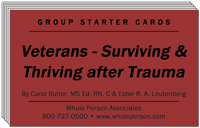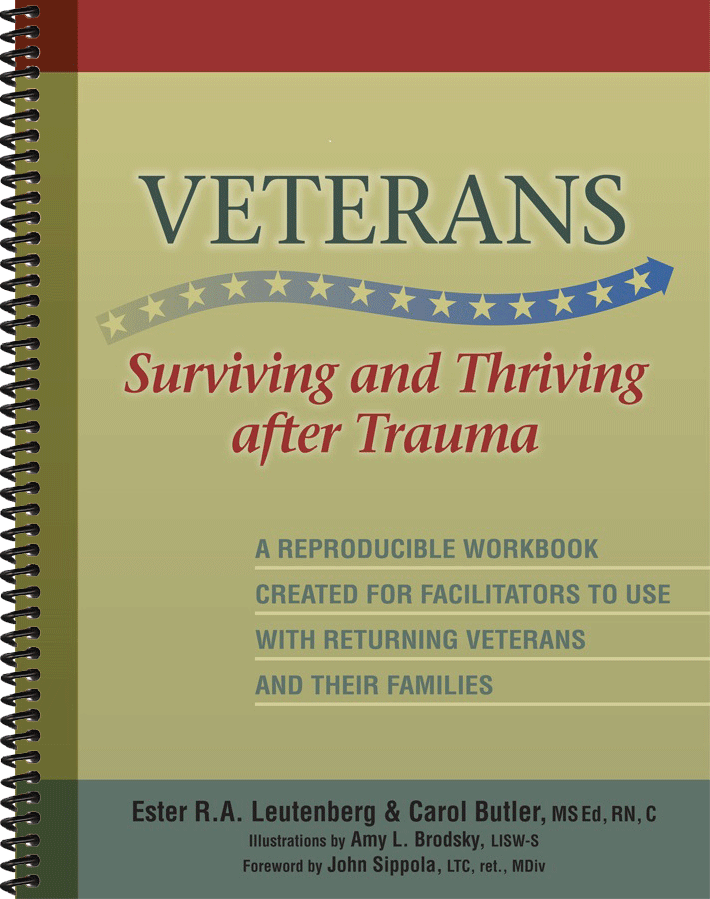Veterans
A reproducible workbook for facilitators to use with returning veterans and their families
Veterans – Surviving and Thriving after Trauma will assist professional facilitators in helping veterans adapt after serving their country. Veterans risked life, limbs, relationships, and careers; some lost one or more of these basic life support systems. They freed others but fight the aftermath of death and destruction. Many suffer emotional and physical scars, guilt, grief, and loss. Some are eaten away by anger or enslaved by substances.
Initially, homecoming is happiness, applause, and affection, but reintegration into daily life does not resume as they knew it. Veterans, their partners, and their families have changed. The labor market may not welcome their skills; their finances may plunge. Statistics show alarmingly high suicide and unemployment rates.
As more veterans return from combat, society is increasingly aware of their needs, directing them toward professional and spiritual counselors. Veterans differ from other abuse survivors; they have seen atrocities and experienced horrors most civilians cannot comprehend. Their intelligence, determination, and resilience that served our country are now needed to save themselves, to heal their invisible and visible wounds.
The Veterans – Surviving and Thriving after Trauma workbook will help facilitators working with veterans:
- Individually
- In groups
- In conjunction with their partners or families
The book’s goal is for participants to …
- Realize they are not alone in facing fears, feelings, and challenges.
- Reintegrate, as changed people, into their families and civilian life.
- Deal with trauma, stress, depression, guilt, and grief.
- Overcome anger and resentment.
- Prevent or begin recovering from substance abuse.
- Handle relationship issues.
- Rebound and rehabilitate emotionally, physically, vocationally, and spiritually.
- Cope, using cognitive, creative, expressive, altruistic, and other modes.
Veterans with or without severe emotional, physical, relationship, and financial problems will benefit from the exercises that apply to their many challenges.
Research indicates cognitive therapy helps veterans deal with trauma and helps them improve their lives. The activities focus directly on recognizing and changing distorted ideas. Veterans see how thoughts affect feelings and actions. They are encouraged to think and act as survivors, to empower themselves to thrive despite setbacks or losses.
Topics covered in the book include:
- Homecoming – to help veterans reintegrate into families and communities and recognize that they and others have changed; to address ways to deal with partners, children, and parents.
- Stress – to help veterans recognize and begin to heal from emotional wounds, including PTS(D), traumatic brain injury, and other conditions; to emphasize cognitive changes and mental and physical health habits.
- Anger – to help veterans process issues, safely vent and express their feelings, and learn ways to de-escalate themselves and others; to highlight risks for domestic violence and safety.
- Depression – to help veterans recognize signs of depression to begin healing and avoid digging deeper into despair; to incorporate hope and resilience. Sabotaging suicide is emphasized here and throughout the book.
- Guilt – to help veterans decrease the effects of guilt regarding death, destruction, and atrocities they were involved in or witnessed; to incorporate making amends and righting wrongs when possible.
- Grief – to help veterans survive the loss of best buddies and others; to help them recognize the stages of grief and carry the torch for those they lost; to address survival guilt.
- Substance Abuse – to help veterans recognize substance abuse or efforts to self-medicate with alcohol or drugs; to learn how substances intensify the spiral of ups and downs related to war’s aftermath and other factors.
- Coping Skills – to help veterans with cognitive, problem solving, and expressive activities through art, music, writing, and other methods; to teach and emphasize relaxation techniques.
- Relationships - to help veterans survive issues at home, including infidelity and breakups.
- Rebounding – to help veterans deal with physical injuries and begin the process of physical healing. Options include vocational rehabilitation.
This workbook is also available in PDF eBook format, making it simple to store on your computer or mobile device and access with a PDF viewer. The PDF format allows you to easily print copies of the activities and worksheets during therapy and counseling sessions.
 Veterans Card Deck
Veterans Card Deck
Need a creative way to start your session? Use the Veterans – Surviving & Thriving after Trauma Card Deck. The open-ended questions will break the ice and stimulate conversation. Use them alone or in conjunction with the corresponding page in the book.
Sample Questions:
Integration involves combining, incorporating or assimilating. How is your re-entry into family and community similar to and different from your induction into your military group?
It has been said, put your butt in the right place and your head and heart will follow. Share a positive step you took despite reluctance. How did your resultant thoughts and feelings change?
In childhood you were probably asked what you wanted to be when you grew up. How did your military experience affect your career aspirations?


